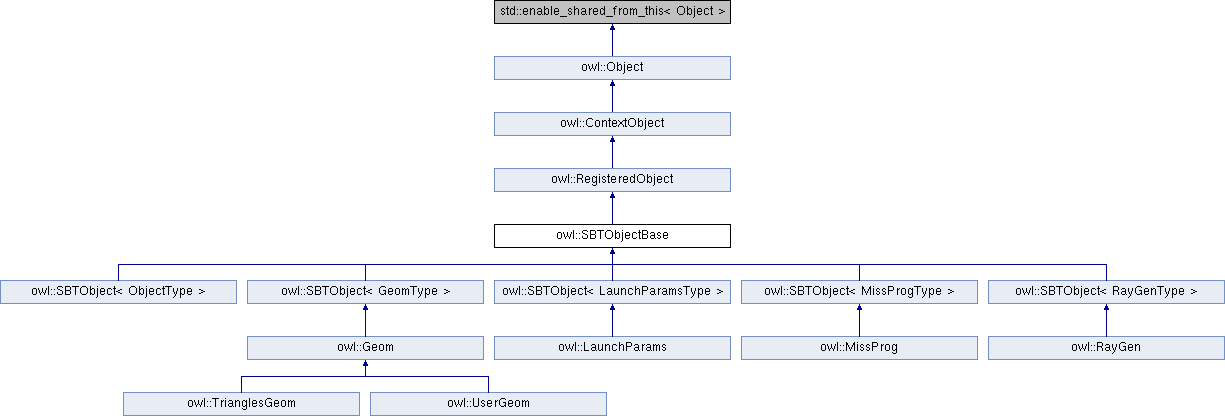#include <SBTObject.h>

Public Member Functions | |
| SBTObjectBase (Context *const context, ObjectRegistry ®istry, std::shared_ptr< SBTObjectType > type) | |
| bool | hasVariable (const std::string &name) |
| Variable::SP | getVariable (const std::string &name) |
| void | writeVariables (uint8_t *sbtEntry, const DeviceContext::SP &device) const |
 Public Member Functions inherited from owl::RegisteredObject Public Member Functions inherited from owl::RegisteredObject | |
| RegisteredObject (Context *const context, ObjectRegistry ®istry) | |
| ~RegisteredObject () | |
 Public Member Functions inherited from owl::ContextObject Public Member Functions inherited from owl::ContextObject | |
| ContextObject (Context *const context) | |
| std::string | toString () const override |
 Public Member Functions inherited from owl::Object Public Member Functions inherited from owl::Object | |
| Object () | |
| virtual DeviceData::SP | createOn (const std::shared_ptr< DeviceContext > &device) |
| void | createDeviceData (const std::vector< std::shared_ptr< DeviceContext >> &devices) |
| template<typename T > | |
| std::shared_ptr< T > | as () |
Public Attributes | |
| const std::vector< Variable::SP > | variables |
| std::shared_ptr< SBTObjectType > const | type |
 Public Attributes inherited from owl::RegisteredObject Public Attributes inherited from owl::RegisteredObject | |
| int | ID |
| ObjectRegistry & | registry |
 Public Attributes inherited from owl::ContextObject Public Attributes inherited from owl::ContextObject | |
| Context *const | context |
 Public Attributes inherited from owl::Object Public Attributes inherited from owl::Object | |
| const size_t | uniqueID |
| std::vector< DeviceData::SP > | deviceData |
Additional Inherited Members | |
 Public Types inherited from owl::ContextObject Public Types inherited from owl::ContextObject | |
| typedef std::shared_ptr< ContextObject > | SP |
 Public Types inherited from owl::Object Public Types inherited from owl::Object | |
| typedef std::shared_ptr< Object > | SP |
 Static Public Attributes inherited from owl::Object Static Public Attributes inherited from owl::Object | |
| static std::atomic< uint64_t > | nextAvailableID |
Detailed Description
abstract base classs for any object that can store variables and write itself into a device-side shader binding table (ie, raygen programs, closest hit programs, etc. Each SBTObjectBase has a type that describes its variables, but the actual work for subclasses of this type will be done in the subclass.
Constructor & Destructor Documentation
◆ SBTObjectBase()
| owl::SBTObjectBase::SBTObjectBase | ( | Context *const | context, |
| ObjectRegistry & | registry, | ||
| std::shared_ptr< SBTObjectType > | type | ||
| ) |
create a new SBTOBject with this type descriptor, and register it in that registry
Member Function Documentation
◆ getVariable()
|
inline |
return shared-ptr to this variable - should only be called for variables that we actually own
◆ hasVariable()
|
inline |
returns whether this object has a variable of this name
◆ writeVariables()
| void owl::SBTObjectBase::writeVariables | ( | uint8_t * | sbtEntryBase, |
| const DeviceContext::SP & | device | ||
| ) | const |
this function is arguably the heart of the owl variable layer: given an SBT Object's set of variables, create the SBT entry that writes the given variables' values into the specified format, prorperly translating per-device data (buffers, traversable) while doing so (also works for launch params, even though those, strictly speaking, are not part of the SBT)
Member Data Documentation
◆ type
| std::shared_ptr<SBTObjectType> const owl::SBTObjectBase::type |
our own type description, that tells us which variables (of which type, etc) we have
◆ variables
| const std::vector<Variable::SP> owl::SBTObjectBase::variables |
the actual variable values
The documentation for this struct was generated from the following files:
- owl/SBTObject.h
- owl/SBTObject.cpp